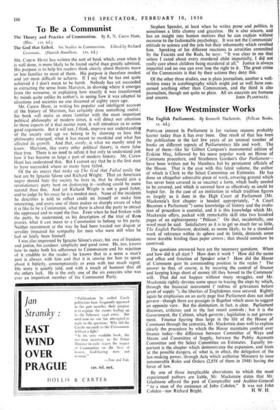How Westminster Works
The English Parliament. By Kenneth Mackenzie. (Pelican Books.
' ts. 6d.)
POPULAR interest in Parliament is for various reasons probably keener today than it has ever been. One result of that has been the publication in the last few years of an unusual number of books on different aspects of Parliamentary life and work. The best of them—like Sir Gilbert Campion's monumental edition of Erskine May, followed by his more popular work on House of Commons procedure, and Strathearn Gordon's Our Parliament— have been written not by Members but by permanent officials of the House. That is the case with this latest volume, the author of which is Clerk to the Select Committee on Estimates. He has done an altogether admirable piece of work, covering ground which has never been covered in so succinct a form, which badly needed to be covered, and which is covered here as effectively as could be hoped for. In the case of an institution in which tradition figures as -largely as it does in the High Court of Parliament (Mr. Mackenzie's first chapter is headed appropriately, " A Court Becomes a Parliament ") some knowledge of history and the evolu- tion of procedure is essential, and it is this knowledge which Mr. Mackenzie offers, packed with remarkable skill into two hundred pages of an eighteenpenny " Pelican." On that, incidentally, one word must be said. Satisfactory as it is to get so much for so little, The English Parliament, destined, as seems likely, to be a standard work of reference within its sphere and its limits, demands some more durable binding than paper covers ; that should somehow be contrived.
The questions answered here are the necessary questions. When and how did it all start ? How does it work ? How did the name and office and function of Speaker arise ? How did the House of Commons gain its commanding position in the realm ? The answer to that, of course, is by securing the control of finance and keeping kings short of money till they bowed to the Commons' will. That did not happen without many struggles, and Mr. Mackenzie rightly devotes some space to tracing the steps by which, through the financial instrument (' redress of grievances before grant of supply "), the liberties of Englishmen were secured. Rightly again he emphasises on an early page that Parliament does not itself govern—though there are passages in Bagehot which seem to suggest an opposite view. But the distinction, in fact, is clear. Parliament discusses, criticises and in the last resort controls ; but it is the Government, the Cabinet, which governs legislation is not govern- ment. Finance figuring thus large in the life of the House of Commons through the centuries, Mr. Mackenzie does well to explain clearly the procedure by which the House maintains control over finance today—the difference between Committee of Ways and Means and Committee of Supply,- between the Public Accounts Committee and the Select Committee on Estimates. Equally im- portant is the chapter which demonstrates the expansion, and hints at the possible dangers, of what is, in effect, the delegation of the law-making power, through Acts which authorise Ministers to issue innumerable Rules and Orders (2,858 of them in 1948) having the force of law.
By one of those inexplicable aberrations to which the most experienced authors are liable, Mr. Mackenzie states that Mr. Gladstone offered the post of Comptroller and Auditor-General " to a man of the eminence of John Cobden." It was not John


































 Previous page
Previous page